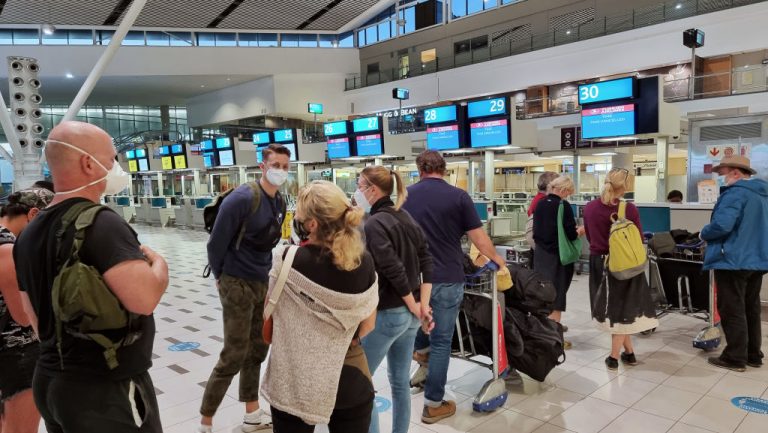A new variant of the COVID-19 virus was discovered in South Africa and has raised alarm bells all over the world. The United States, UK, and the EU have banned flights from African nations following the discovery. The variant, Omicron, is believed to potentially be more resistant to existing COVID-19 vaccines. Some people think that the strain could be more transmissible than the Delta variant, which is the dominant strain at present.
South African scientists have linked the variant to an exponential surge in COVID-19 infections in the country. The Omicron strain was first discovered on Nov. 24. The World Health Organization (WHO) has classified it as a “variant of concern” and has a “large number of mutations” which are “concerning.”
In the United States, travelers from eight African nations—South Africa, Eswatini, Botswana, Lesotho, Namibia, Zimbabwe, Malawi, and Mozambique—will be banned from entering America starting Nov. 29.
According to officials, the decision was taken “out of an abundance of caution.” The new rule does not affect U.S. citizens and permanent residents. President Joe Biden insisted that the ban is a “precautionary measure” taken until more information on the variant is discovered.
As of Nov. 26, the UK government has banned flights from six African nations, including South Africa. Four more African countries were added to the travel red list on Nov. 28. Those who are allowed entry from the ten countries will have to submit to quarantines. The UK has found two cases of Omicron among travelers who came from South Africa; infected individuals have been put in self-isolation.
Success
You are now signed up for our newsletter
Success
Check your email to complete sign up
British Prime Minister Boris Johnson announced a slew of new COVID-19 restrictions. Those who arrive in the UK must take a PCR COVID-19 test on the second day and keep themselves isolated until the results come out.
If infected with the Omicron variant, people who came into close contact with the individual will have to self-isolate irrespective of whether they are vaccinated or not. Citizens have to wear face masks while using public transport or visiting shops.
The British PM argued that the new measures are necessary to take “targeted and precautionary” measures following the two Omicron cases found in the country. “Right now this is the responsible course of action to slow down the seeding and the spread of this new variant and to maximize our defenses,” Johnson said at a news conference.
On Nov. 26, all 27 member states of the European Union announced the temporary suspension of flights from seven African nations. Germany has classified South Africa as a “virus variant area” and has restricted airlines to only transporting German nationals and permanent residents from the African nations.
Everyone who arrives in Germany will have to undergo a 14-day quarantine, including those who have recovered from the infection or been vaccinated. France, Greece, Denmark, Italy, and the Czech Republic have all announced some type of travel restrictions from southern African nations.
“Our view is very clear… We need to act very fast, we need to be vigilant, and we need to take all measures that are appropriate at this stage to prevent this virus from entering Europe,” Dana Spinant, deputy chief spokeswoman for the European Commission, said at a news conference.
South Africa has called the global travel bans imposed on the country unjustified. Health Minister Joe Phaahla stated that his country was acting with necessary transparency and that travel bans were against WHO standards. Foreign Minister Naledi Pandor raised concerns that the travel bans could cause serious damage to tourism and business.














